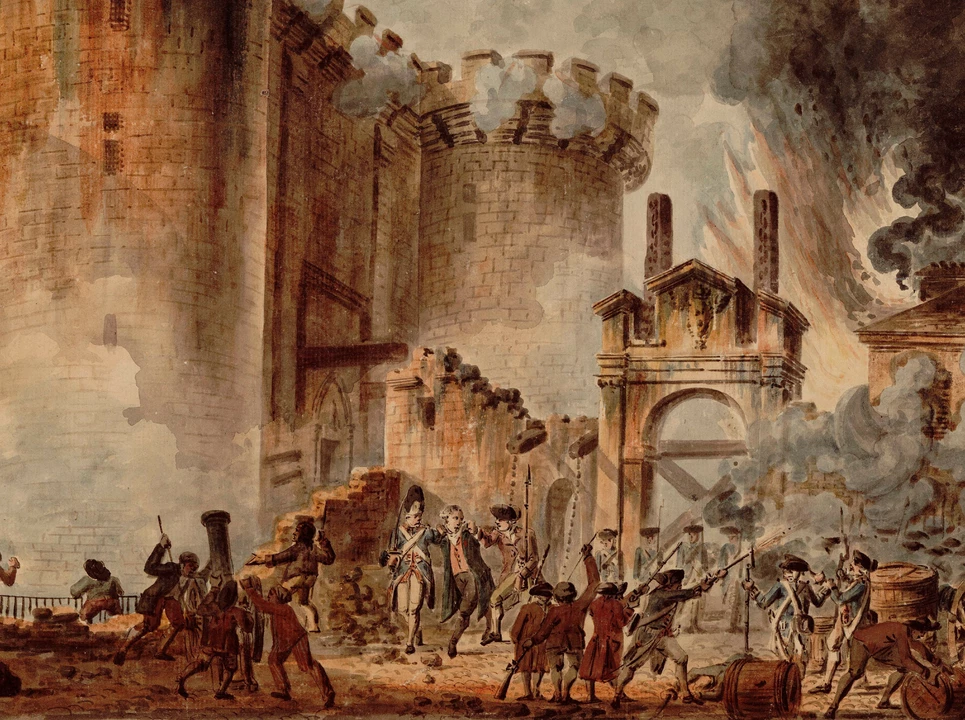
What happened in 1789?
The French Revolution Begins
1789 was a year of significant change in the world, especially in France. The French Revolution, a pivotal moment in European history, began in this year. This revolution was a response to the widespread social inequality and financial crisis that plagued the nation. The French people, who had long suffered under the oppressive rule of the monarchy, decided that they had had enough and took to the streets to demand change.
The revolution was not a quick or easy process, but it began with the meeting of the Estates-General in May. The Estates-General was a legislative body made up of representatives from each of the three social classes in France: the clergy, the nobility, and the commoners. This meeting was the first step in addressing the nation's economic and social issues, and it marked the beginning of a long and tumultuous journey towards a more just and equal society.
As the revolution progressed, several key events occurred, such as the storming of the Bastille in July, which was seen as a symbol of the monarchy's tyranny. This event marked a turning point in the revolution, as the people of France began to take more direct action against their oppressors. Other events, like the Women's March on Versailles in October, further demonstrated the widespread dissatisfaction with the current state of affairs in France and the desire for change.
George Washington's Inauguration
Across the Atlantic, another significant event was taking place in 1789: the inauguration of George Washington as the first President of the United States. Washington's inauguration marked the beginning of a new era for the young nation, which was still recovering from the effects of the Revolutionary War and struggling to establish a stable government.
Washington's leadership and vision for the country were instrumental in setting the United States on the path to success. His commitment to a strong central government, balanced by the rights of individual states, laid the foundation for the American political system that we know today.
As President, Washington faced numerous challenges, including managing the country's finances, establishing a national bank, and maintaining neutrality in the face of European conflicts. His presidency also saw the adoption of the Bill of Rights, which guarantees fundamental freedoms and rights to all American citizens. Washington's presidency was a crucial period in American history, setting the stage for future growth and prosperity.
William Wilberforce's Anti-Slavery Speech
In the midst of the French Revolution and the inception of the American Presidency, another important event took place in 1789: the British abolitionist William Wilberforce delivered a powerful speech in Parliament, calling for an end to the slave trade. This speech marked the beginning of a long campaign against slavery in the British Empire, which would eventually lead to its abolition in 1833.
Wilberforce's speech highlighted the inhumane and brutal nature of the slave trade, detailing the terrible conditions that enslaved Africans faced during the Middle Passage and their subsequent lives on plantations. By drawing attention to these atrocities, Wilberforce hoped to inspire his fellow Members of Parliament to take action against this horrific practice.
Although the abolition of the slave trade was still several decades away, Wilberforce's speech marked an important step forward in the fight against slavery. It also served as a reminder that amidst the political turmoil and societal changes of 1789, there were those who continued to fight for the rights and dignity of all people.
The Mutiny on the Bounty
Another significant event that occurred in 1789 was the famous Mutiny on the Bounty. The Bounty was a British ship that had been sent to the South Pacific to collect breadfruit plants, with the aim of introducing them as a food source for slaves in the West Indies. The voyage, led by Captain William Bligh, would ultimately end in mutiny and the establishment of a settlement on the remote Pitcairn Island.
The mutiny was sparked by a combination of factors, including harsh discipline, poor living conditions, and the allure of the idyllic life experienced by the crew during their time in Tahiti. When tensions reached a boiling point, the ship's mutineers, led by Fletcher Christian, seized control of the Bounty and cast Captain Bligh and his loyal crew members adrift in a small boat.
Despite the odds, Bligh and his crew managed to navigate their way to safety, covering over 3,600 miles in an open boat. The mutineers, on the other hand, established a settlement on Pitcairn Island, where their descendants still live today. The Mutiny on the Bounty serves as a reminder of the harsh realities of life at sea during this period and the lengths that some were willing to go to in search of a better life.
The Publication of The Interesting Narrative of the Life of Olaudah Equiano
1789 also saw the publication of The Interesting Narrative of the Life of Olaudah Equiano, an autobiography written by a former slave that detailed his life and experiences. Equiano's book was one of the first works to give a firsthand account of the brutalities of slavery, and it played a significant role in the abolitionist movement.
Equiano's narrative chronicled his life from his childhood in Africa, through his capture and enslavement, to his eventual freedom and life as a free man in England. The book shed light on the horrors of the slave trade and the inhumane treatment of enslaved people, helping to raise awareness of the need for abolition.
The Interesting Narrative of the Life of Olaudah Equiano was widely read and distributed, both in Britain and the United States, and it influenced public opinion on the issue of slavery. The book's publication was an important milestone in the fight against the slave trade and the broader struggle for human rights.
The Birth of the United States Bill of Rights
In the same year that George Washington was inaugurated as the first President of the United States, the nation also saw the birth of the Bill of Rights. These first ten amendments to the US Constitution were introduced by James Madison in 1789 and were ratified by the states in 1791.
The Bill of Rights was created in response to concerns that the US Constitution did not adequately protect the rights and liberties of individual citizens. The amendments outline a number of fundamental rights, including freedom of speech, the right to bear arms, and protection from unreasonable searches and seizures.
The establishment of the Bill of Rights was a crucial step in the development of the American political system, ensuring that individual liberties were protected and enshrined in the nation's founding document. The Bill of Rights remains a cornerstone of American democracy and a vital part of the nation's identity.
The Invention of the Hot Air Balloon
1789 was also a year of innovation and discovery, as evidenced by the invention of the hot air balloon. The Montgolfier brothers, Joseph-Michel and Jacques-Étienne, were responsible for this groundbreaking invention, which would go on to revolutionize the way humans viewed the world and their place in it.
The Montgolfier brothers' first successful hot air balloon flight took place in 1783, but it was in 1789 that they continued to develop and perfect their design, leading to larger and more sophisticated balloons. Hot air balloons captured the public's imagination and inspired a new era of exploration and adventure.
The invention of the hot air balloon was not only a technological marvel but also a symbol of the spirit of the age. As the world underwent significant political and social upheaval, the hot air balloon represented the possibilities of human ingenuity and the potential for a brighter future.
Conclusion: A Year of Change and Progress
1789 was a year of immense change and progress, marked by events such as the beginning of the French Revolution, the inauguration of George Washington, and the publication of Olaudah Equiano's groundbreaking autobiography. These events, along with others like the Mutiny on the Bounty and the invention of the hot air balloon, demonstrate the transformative nature of this year in history.
As we look back on 1789, we can see how the events of that year laid the groundwork for much of the political, social, and technological progress that would follow. By remembering and learning from this pivotal year, we can continue to strive for a more just, equitable, and innovative world.

Write a comment